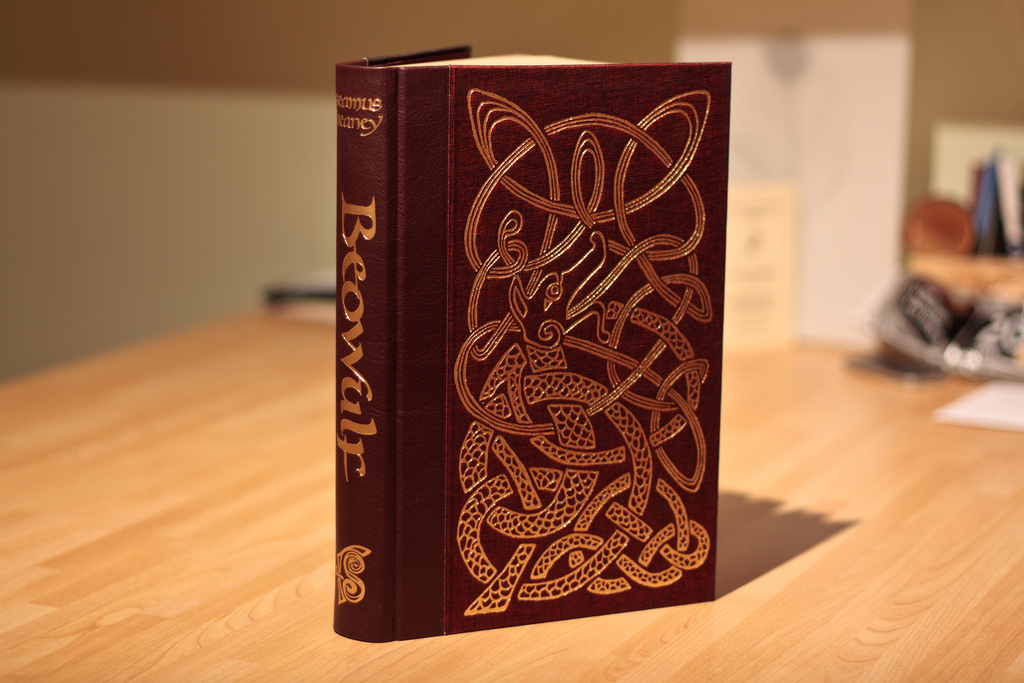Beowulf is an epic poem that was written between “700 and 1,000 A.D. in England” (The British Library). Beowulf tells the story of a terrifying demon named Grendel and his ultimate defeat by a young Geatish warrior named Beowulf. Beowulf is written perhaps with a great emphasis on morality and the strength of a man. Beowulf is considered to have an amazing structure, one that centers around Beowulf’s ultimate challenges. Although the elements of an epic are all involved, Beowulf is an epic of a new breed. The structure of Beowulf ultimately functions for the poem’s goal: showing the ultimate morality and strength of willpower in a man.
Structure
Beowulf was written with the six elements of an epic, much like other poems in this genre. These elements include, “plot centers around a hero of unbelievable stature, involves deeds of superhuman strength and valor, vast setting, involves supernatural and-or otherworldly forces, sustained elevation of style and the poet remains objective and omniscient” (Drake). The unbelievable hero is Beowulf who indeed shows superhuman strength and valor. The vast setting can be seen as Beowulf travels across the sea and land to reach Grendel’s space. Grendel, a demon is a sign of supernatural of otherworldly forces, and throughout Beowulf, the author remains objective and omniscient, or the author sees all or knows all.
Beyond the six elements of the epic poem which are present, Beowulf presents a unique structure that is divided into three main parts. These three parts all center around Beowulf’s ultimate fight with a monster. The first section involves his plight with Grendel, the demon who has terrorized the kingdom. The second focused on his fight with the angry and saddened Grendel’s mother. Finally, the third section involves Beowulf’s fight against the dragon. There are several different ways this structure can be translated and explained. However, it is important to mention that Beowulf went through three distinct challenges, each one more difficult than the one before. Beginning with Grendel, Beowulf begins his heroic journey by purging the kingdom from this horrible nuisance. Beowulf is then celebrated for this feat. Next, Beowulf must conquer Grendel’s mother who is overcome by vengeance, much like Beowulf’s vengeance against Grendel. As most will know, all great and heroic reigns must end in fate. Beowulf must fight against the dragon at the end, which is a play on his fate as a hero. Beowulf gives his life for his people, thus being celebrated for years to come. Beowulf begins as a hero, and the epic slowly escalates, and conflict rises. The climax ensues when Beowulf meets the dragon and ultimately gives his life for others.
This structure does a great deal for the overall function of the epic. If one believes that the function of Beowulf is to show a hero’s ultimate fate, then the overall structure of this poem is one that shows each and every part of his calling in detail. From the beginning of his reign to the ultimate end, Beowulf is shown in three different lights: a hero fighting for his people, a hero fighting against vengeance and a hero ultimately reaching his untimely fate for those he loves.
Works Cited
Drake, Tom. “Six Elements Of The Epic.” University of Idaho, www.webpages.uidaho.edu/engl257/General lit/six_elements_of_the_epic.htm.
The British Library. “Beowulf.” The British Library, 9 Dec. 2014, www.bl.uk/collection-items/beowulf.
Literature Paper Writing Help from the Experts
More than that, we are convinced you wouldn’t even want to, since we have a lot of awesome things to offer. Apart from this “Beowulf” analysis sample, we have paper samples with analysis of the most popular books often studied at school and college. Check them out for more ideas, or use our essay prompt generator to find more awesome topics! We also have a lot of useful articles considering writing problems students encounter. If you need to battle writer’s block, check our posts with topic suggestions, and we are sure you will find something nice.

Great points to discuss
As a student I’m very interested in the list of research topics you posted. Thank you… your post is interesting.